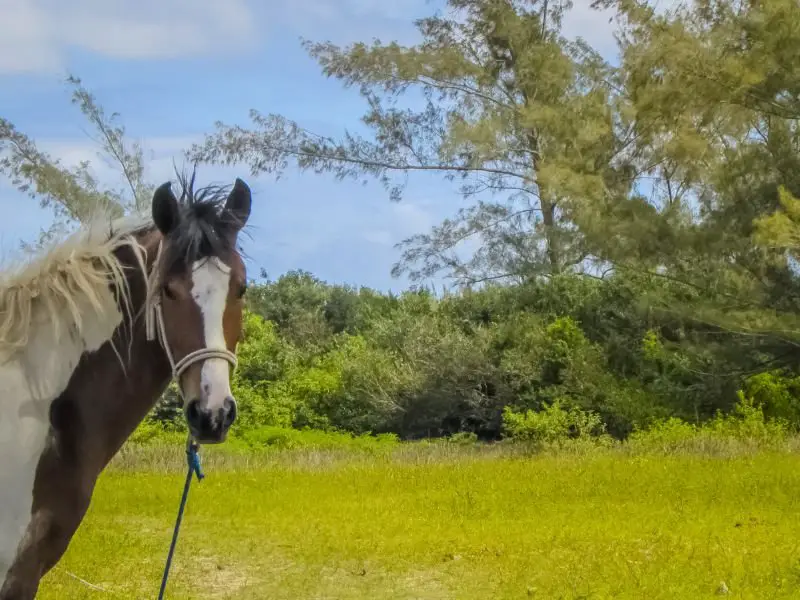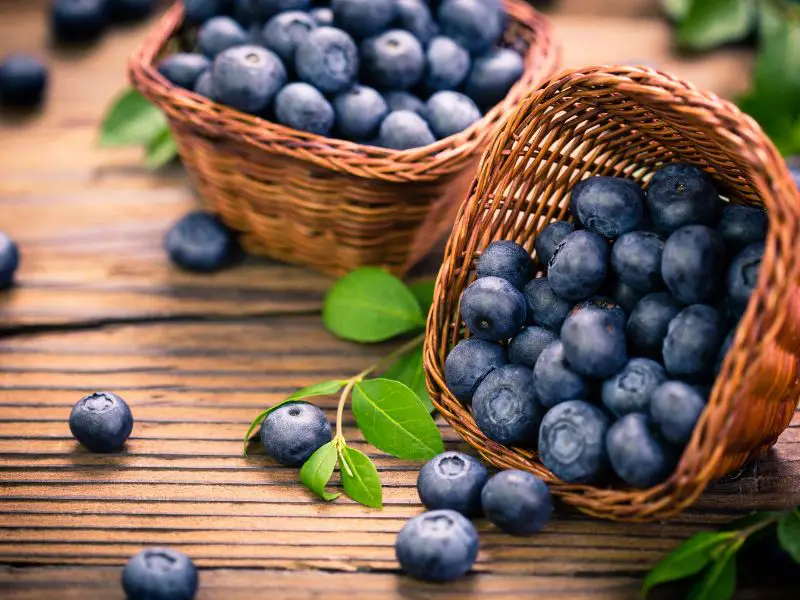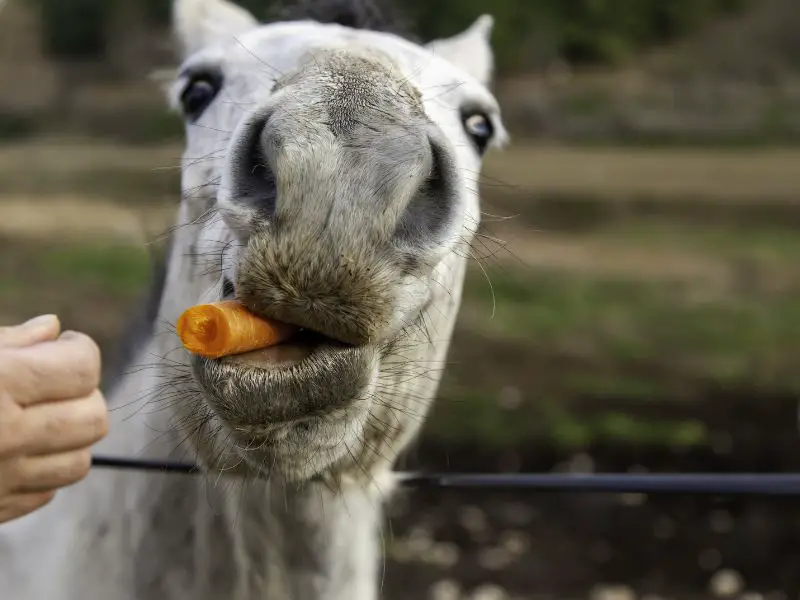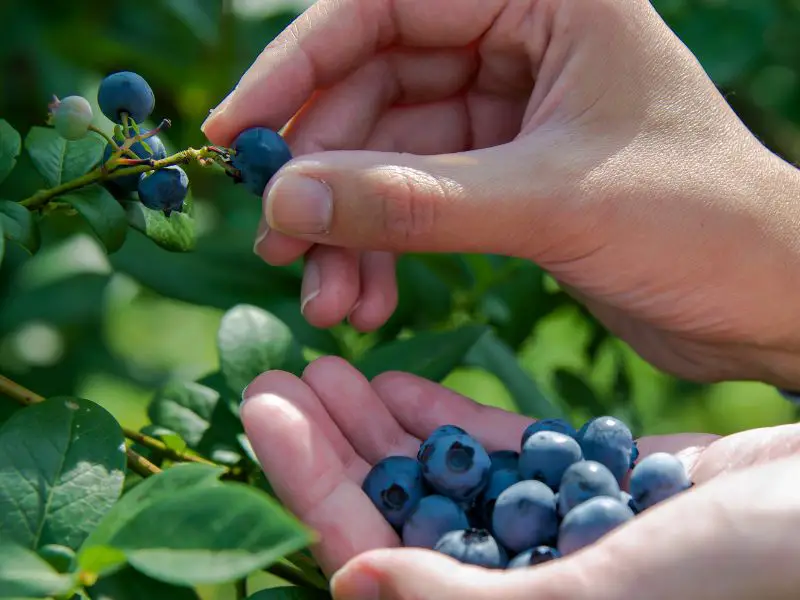As a horse lover, you understand the joy of watching your equine friend relish a well-deserved treat.
Like us, horses appreciate a little variety in their diets. One such delightful treat you might have been considering is the blueberry, a tiny fruit known as a “superfood” among us humans.
But can horses eat blueberries safely?
This guide will explore these questions, debunk myths, and help you understand how to incorporate blueberries into your horse’s diet safely and nutritiously.

Understanding Your Horse’s Digestive System
Horses possess a unique and delicate digestive system. Unlike us, their stomachs are relatively small, and they’re designed to graze on small meals throughout the day.
A horse’s digestive health is a crucial aspect of its overall wellbeing. Therefore, it’s critical to be careful about what we feed them, especially when it comes to treats.
Fruits, including blueberries, can affect a horse’s digestive system. While they’re generally healthy options, feeding your horse too many fruits may cause upset stomach, diarrhea, or more serious issues like colic.
The key, like with many things in life, is moderation. Even the healthiest treat can turn troublesome if overfed.

Can Horses Eat Blueberries?
You’ll be pleased to know that blueberries are completely safe for horses to eat.
In fact, not only are they non-toxic, but they also come with numerous health benefits:
- Vitamins: Blueberries are rich in several vitamins, including A, multiple B-vitamins, and vitamin C.
- Minerals: These small berries pack a punch with minerals such as Iron, Magnesium, Calcium, Manganese, Potassium, and Phosphorus.
- Antioxidants: Blueberries are loaded with antioxidants, which can help fight inflammation and boost your horse’s immune system.
While blueberries are safe, there are a few things you should remember. Be mindful of the ripeness of the berries – fresh, ripe ones are best.
Avoid feeding your horse any rotten or overripe blueberries, as they could potentially make your horse ill.
Despite their numerous benefits, remember that blueberries are a treat and should not replace the primary diet of grass and forage.
As for the quantity, stick to a small handful of blueberries at a time, approximately 8-12. It’s always best to start slow, introducing a new treat to your horse’s diet and observing their response.
If they take to blueberries without any digestive issues, you’ve successfully added a healthy treat to their diet!

Ways To Feed Blueberries to Your Horse
There are several ways to offer blueberries to your horse, and you can have fun figuring out their preference.
They can be cut into halves, mixed with oats or seeds, combined with other safe fruits, or given as frozen treats during hot summer days.
You can also bake them into biscuits, ensuring to maintain low sugar levels to prevent any health issues.
Before serving, always wash the blueberries thoroughly to remove bacteria, viruses, and potential pesticides. Only give ripe blueberries to horses, especially if they have hypersensitivity. Unripe or rotten blueberries can upset their stomachs, causing discomfort and potentially leading to vomiting.
Here is a table of the ideas for ways to feed blueberries to your horse:
| Method | Description |
|---|---|
| Cutting Blueberries in Half | Although the size of blueberries isn’t a choking hazard for horses, you might still cut them in half, especially for smaller horses or ponies. |
| Mixing with Oats or Seeds | Incorporate a few blueberries into your horse’s usual oat or seed mix. |
| Using Blueberry Cookies | Horse cookies with blueberry flavor can be a big hit! |
| Mixing with Other Fruits | Create a tasty fruit salad by mixing blueberries with other horse-safe fruits. |
| Frozen Blueberries | Especially on hot days, frozen berries can be a refreshing treat. |

Other Treat Options for Your Horse
Horses naturally have a sweet tooth, and besides blueberries, several other fruits can satisfy their craving for treats.
Apples and carrots are classic favorites, but horses also enjoy:
- bananas
- pears
- grapes
- strawberries
- melons
However, not all fruits are safe, and some, like tomatoes and avocados, can be toxic to horses.
Any new fruit should be introduced gradually, and the horse’s response observed closely. Each horse’s tolerance to certain foods may vary, and what works for one horse might not work for another.
And remember before feeding any fruit, be sure to wash it thoroughly to remove any chemicals or pesticides.

Wrapping Up About Blueberries and Horses
Feeding your horse blueberries can be a wonderful way to provide a nutritious treat.
They’re safe, beneficial, and most horses find them tasty. However, like any treat, they should be fed in moderation.
Remember, the aim is to add variety to your horse’s diet and not to replace their regular meals.
With this in mind, you’re all set to introduce your horse to the delightful taste of blueberries.
Here’s to many berry tasty times ahead!
Cheers, Kacey
P.S. Did you find this article informative? Canter over to these other great reads:

